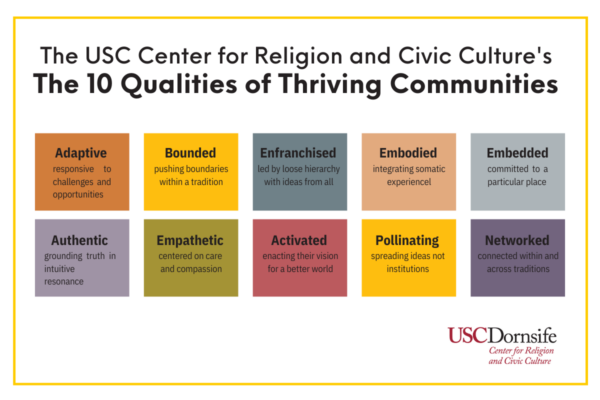Even as religious affiliation continues to decline, CRCC’s research on religious creativity and innovation has found groups that are thriving across religious traditions. While not necessarily large (though some are), these groups engage participants of a particular faith, of multiple faiths or none, and help them satisfy the basic goals of faith communities: providing meaning, community and identity. Based on our work over the last several years, starting with large-scale research project of successfully innovative religious groups, CRCC formed a framework for “thriving communities.”
Not all of the following ten characteristics are found in the same combination or strength in all thriving communities. However, we believe that the presence of these characteristics, and of both leaders and lay persons committed to their communities having these characteristics, is what separates thriving faith communities from those that are declining or perhaps relying on their history and tradition for their survival.
Thriving communities are:
- Adaptive, responding to new social challenges and opportunities with a sense of possibility, rather than a sense of fear
- Activated, enacting their faith with a vision for a better world
- Authentic, grounding truth in intuitive resonance for both members and those outside the group such that the beliefs, practices and identity of the community “makes sense”
- Bounded by their religious traditions but push those boundaries through innovative ideas and practices that remain true to their tradition while expanding how those traditions can make sense in contemporary society
- Embedded in a particular place, committed to the well-being of their local communities
- Embodied, integrating somatic experience with their written and oral teachings and traditions
- Empathetic, centered on care and compassion for both their members and for those in their host communities
- Enfranchised, having no strict hierarchy, instead, they welcome ideas from leaders and members alike, as well as from sources outside their community
- Networked through strong connections with other groups, within and across faith traditions and those with no faith tradition or identity.
- Pollinating, being more interested in sharing ideas and practices than in developing institutions or institutional structures




